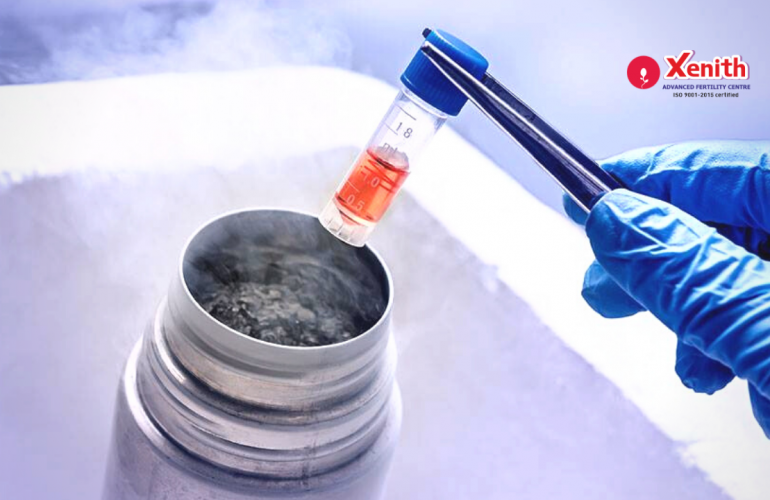You have reached the big “four O” and might feel like you have achieved a lot in your education and career journey and learned how to better navigate through the ups and downs in your life. Now you are ready to settle down and start a family. While going through this, you might encounter some challenges and its good to know the risks of trying to conceive at this age and how you could improve your chances of conceiving. The definition of infertility above age 35, is the failure to conceive after having unprotected sex for six or more months and it might be helpful to take the advice of your doctor if you are struggling to conceive. Xenith Advanced Fertility Centre has experts who have a wealth of information and offer excellent advice to help you understand your unique circumstances and how you can begin your journey to parenthood as quickly as possible.
Challenges and Risks

Free Thursday Consultation
Book Your AppointmentStudies have found that a woman is most fertile from her late teens to her late 20s and fertility then gradually begins declining upto around age 30 after which there is a sharper decline seen by mid 30s. (1) Since a woman is born with all the eggs she will ever have and this egg count as well as the egg quality decreases over time, it could lead to issues with conception as well as issues during your pregnancy, if you are older. Sperm quality also decreases with age in men leading to decreased fertility. Here are some of the challenges and risks you might face if you are older than 40 and trying to have a child:
- It might take longer to conceive, due to diminishing egg supply as well as poorer quality of eggs and sperm as you get older.
- There is a higher risk of occurrence of genetic disorders or birth defects like Down’s syndrome in babies born to older mothers. There is also a higher chance of learning disabilities or structural defects in the baby’s organs. This could be due to the eggs and/or sperm being of poorer quality.
- There is an increased risk of pregnancy related complications, miscarriages or stillbirth due to defects in the fetus or due to health issues of the mother which are associated with aging.
- There is an increased chance of caesarean section during delivery rather than natural delivery due to increased risk of complications in older women.
- The baby could be born prematurely causing low birth weight and other complications to the baby’s health.
- There could be an increased risk of gestational diabetes and gestational hypertension. Diabetes that develops in the woman during pregnancy and often disappears after birth is called gestational diabetes. High blood pressure which develops during pregnancy and again goes away after birth is called gestational hypertension. So, your sugar levels and your blood pressure might need to be closely monitored to prevent any problems to the mother and the fetus.
- The chances of preeclampsia which is a condition that causes high blood pressure, high levels of protein in the urine or cause damage to certain organs could be higher in older pregnant women. It needs to be monitored carefully and it could even lead to fatalities for mother and baby if not kept under control.
How to increase your chances of having a baby when you are older?
Various things like lifestyle, stress, lack of sleep, genetics, environmental toxins, and how healthy you are, could all affect fertility. Try to eat a healthy, nutritious and balanced diet and make sure you get regular exercise. If you are overweight, try to lose weight. Try to remove stress from your demanding jobs or anything else that causes stress and learn methods on how to alleviate stress. Get enough sleep, stop smoking, drinking alcohol and stay away from any environmental toxins that could decrease your fertility. Discuss with your spouse early on about when you want to start having kids and make an educated decision about balancing education/career and financial planning with having a family. Talk to your doctor about what you could do to improve your fertility and their professional opinion about when you should start having kids, given you and your spouse’s health conditions and genetic history amongst other things. Take any prenatal vitamins or supplements especially folic acid at least a few months before trying to conceive. If you are having problems conceiving, the doctor might suggest fertility testing where you might need to go for blood tests, sperm tests, egg count and ultrasound of your reproductive areas. If you have any genetic conditions, get tested to find out what are the chances of passing this onto your offspring. Your mental health is also important especially if you are having trouble conceiving and it might help to talk to a close friend or family or to a counsellor.
If you have decided beforehand that you wish to have a family later on in life, it might be advantageous to freeze your eggs when you are younger to preserve egg quality. There are also procedures like in vitro fertilization, where the egg is retrieved from the ovaries, fertilized in a lab setting and transferred back into the uterus, and this could improve your odds of conception. Xenith Advanced Fertility Centre has been extremely successful in diagnosing couples struggling with infertility and they have the latest equipment to make sure that the chances of success in pregnancy is not hindered by older technology. The centre has received many awards for their exceptional work in the field of infertility. Fertility could vary from person to person depending on various factors and if you are older and are struggling with infertility, it’s not too late to come talk to the experts at Xenith Advanced Fertility Centre.




